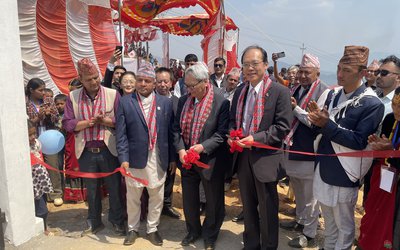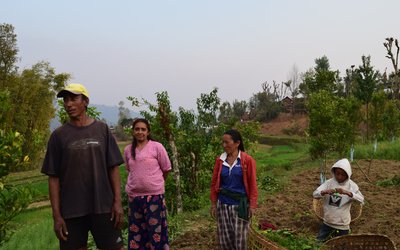For the record, the cancellation of Chinese Premier Wen Jiabao’s high profile official visit to Nepal and Myanmar next week was due to domestic compulsions or what has been described as economic and budgetary issues back in Beijing. While the cancellation has caused serious embarrassment in Kathmandu with Baburam Bhattarai government looking forward to economic and infrastructure assistance, it has also skewed the balancing game often played in the sandwiched Himalayan kingdom.
The script never changes in Nepal only the actors do is the political thumb rule in Kathmandu for balancing both Indian elephant and Chinese dragon. The Nepalese media has put this cancellation of three day visit to economic and political instability in Kathmandu but the reasons apparently were multiple. The cancellation was due to threat to Wen’s security, danger of a fiery reception at the hands of Tibetan refugees, high public bidding by Nepal government spokespersons on the outcome of the visit and a degree of lack of Chinese confidence in present Nepalese leadership.
This apart, other concerns could be much closer to the border with western embassies often using the hippy capital to watch events in Tibet—just 150 kilometres away on the all weather 988 km friendship highway to Lhasa. Beijing on its part has denied any political motives to this cancellation and used Myanmar cancellation as an example to dismiss any diplomatic conspiracies.
Yet one cannot help wondering whether the cancellation of Chinese built and aided Myitsone hydroelectric project on Irrawaddy River headwaters by the Myanmarese junta in September 2011 is the reason behind Wen’s calling off his visit to Burma.
For the moment, I will confine myself to Nepal as it shares 1751 km long open and porous border with Indian Hindi heartland and Chinese inroads into Kathmandu is a matter of serious concern to New Delhi. Advent of Chinese interest in Nepal seriously began after their supporter King Gyanendra was forced to give up power on May 28, 2008 and Beijing suddenly found itself friendless in Kathmandu as they were opposed to Prachanda’s men and had labelled them as anti-government forces. The other reason was pro-active attitude of western embassies led by the US in Tibetan affairs in Kathmandu. The fact is that Beijing was reconciled to Nepal-India relations due to historic linkages but could not afford to have westerners pry into Tibet from Kathmandu watch towers. The net result is that overt moves by westerners in Kathmandu forced Chinese to counter for space in Nepal, which in turn raised hackles of India. Even though Wen’s cancellation has left red faces in Kathmandu, the bottom line is that Beijing is building leverages in Nepal must faster in comparison to New Delhi. The process of integrating Nepal with 3,105 km long Western Tibet Highway and Qinghai Tibet Rail (QTR) has begun with work on four more cross-border linkages in progress apart from the Friendship highway. The QTR is being extended to Yadong, close to Nepal border, and the process to have a gas pipeline all the way up to Kathmandu is progressing fast and the day is not far when Kathmandu will tell Indian Oil Corporation to take a hike.
The Chinese pro-active engagement is in sharp contrast to the Indian lethargy. The cross-border road linkages are poor, the planned rail linkages with Nepalese Terai are on drawing board and there are hardly any high visibility Indian infrastructure projects in Kathmandu. While New Delhi is stopped playing the Viceroy after the exit of Ambassador Rakesh Sood and his government supported policy of political interference with an aim of not allowing the Maoists to come to power, India needs to wake up as the Kathmandu game is going out of hand. The Foreign Direct Investment of Indian private sector is falling in Nepal and has dipped below 50 per cent of the total investment, the hydropower projects are work in progress and even the military to military links are weakening as compared to the past. The security situation on India-Nepal border is precarious, yet not only oneof the four proposed integrated check posts on the international border has been completed. It is clearly evident that the Indian leverage in Nepal is declining with the Chinese linkages on the rise. The age-old links between Nepalese and Indian politicians and political parties have virtually disappeared and Beijing appears a more attractive destination to Nepalese for economic growth than New Delhi.
Given the paralysis in the UPA government decision making, the India-Nepal relations continue at the same indifferent pace as foreign policy is not a priority area for Raisina Hill as it grapples for day to day political existence. The classic example is that it took UPA government more than eight months to replace Sood despite Prime Minister Manmohan Singh agreeing to his replacement in wake of serious criticism of the then ambassador in January 2011. While India’s new Ambassador Jayant Prasad is trying to recover the lost political ground, the Chinese are working with single minded dedication to link Nepal with Lhasa and counter Dalai Lama’s friends in Kathmandu.
Even though New Delhi may cock a snook at Nepal over Wen’s visit cancellation, the very thought of Beijing building roads and dams in Terai is enough to send shivers down the Indian spine. After all, only 45 kilometers of Siliguri chicken neck separates Nepal from Bangladesh.
Courtesy: blogs.hindustantimes.com
- TANAHU HYDROPOWER PROEJCT: A Significant Achievement
- Apr 15, 2024
- AMBASSADOR HANAN GODAR: Sharing Pain With A Nepali Family
- Mar 30, 2024
- VISIT OF KfW AND EIB TO NEPAL : Mission Matters
- Mar 25, 2024
- NEPAL BRITAIN SOCIETY: Pratima Pande's Leadership
- Mar 24, 2024
- NEPAL ARMY DAY: Time To Recall Glory
- Mar 15, 2024















